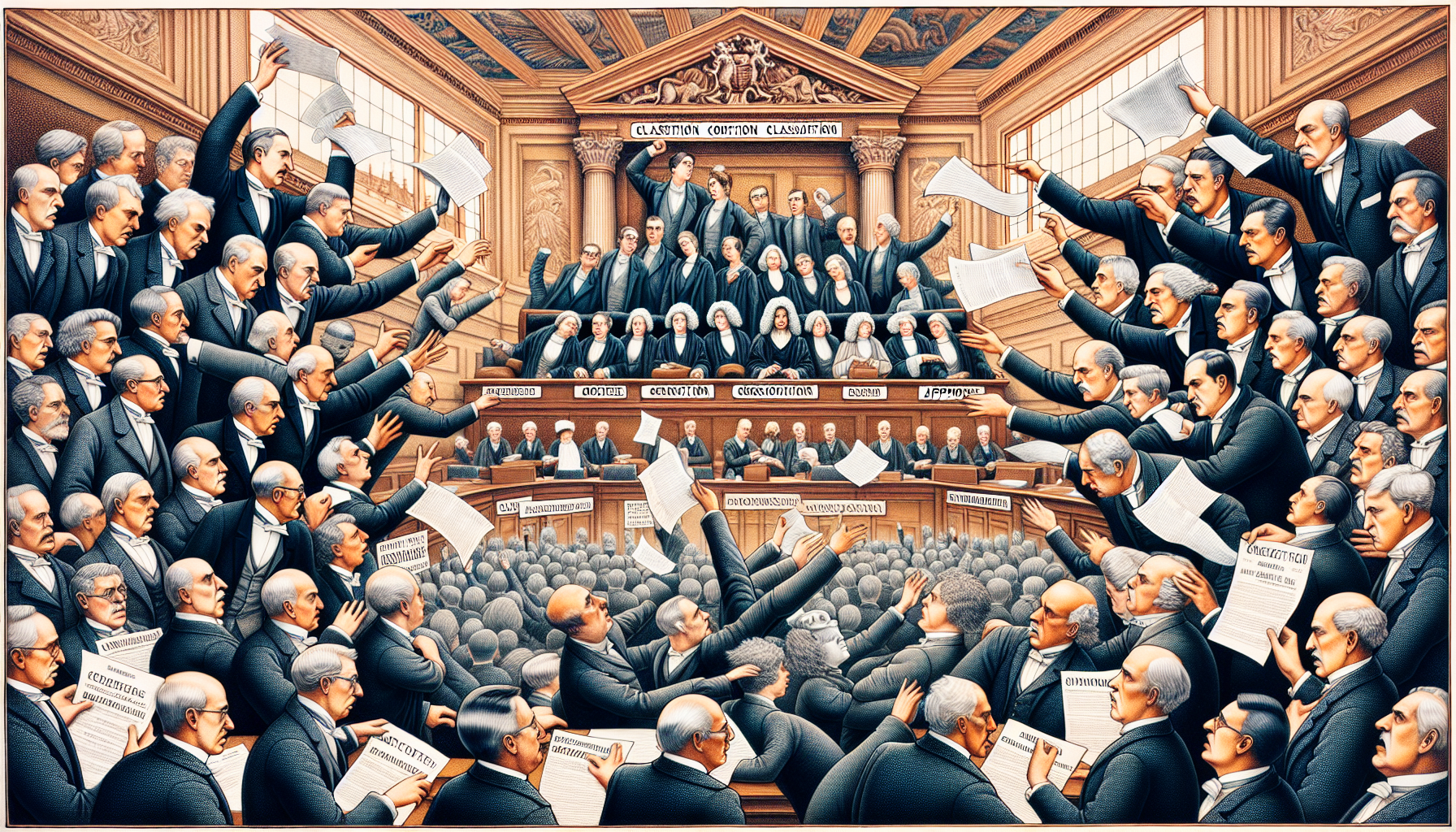Short Answer:
DGCL 141f underpins corporate governance by setting a framework for corporate management via a board of directors. It ensures shareholder interests while allowing board actions without meetings for efficiency. Key aspects include board composition, director qualifications, and voting obligations, promoting balanced power dynamics and governance integrity.
Introduction & Background
As a seasoned attorney with over a decade of experience in venture capital, M&A, and private equity transactions, I’ve navigated the complex terrain of corporate governance with a keen eye on statutes like the DGCL 141f. My tenure at prestigious AM Law 200 firms, including Locke Lord LLP, has afforded me a front-row seat to the intricacies of boardroom dynamics and the critical balance of power between a corporation’s board of directors and its shareholders. Understanding the nuances of the Delaware General Corporation Law (DGCL), particularly section 141f, is crucial for anyone involved in the management or legal advising of corporations operating under Delaware law.
The DGCL 141f is more than just a legal requirement; it’s a blueprint for effective corporate governance, offering a comprehensive framework that guides the management of corporate affairs. Given my deep involvement in major real estate and venture capital transactions, I bring a practical understanding of how DGCL 141f impacts both the strategic and operational aspects of a corporation, ensuring that governance structures support rather than hinder corporate objectives.
Key Takeaways
-
DGCL 141f establishes the board of directors as the key authority for managing a corporation, providing governance frameworks and outlining shareholder rights and the balance of powers within corporate decision-making processes.
-
The statute not only supports flexibility and efficiency in board actions and stockholder approvals without meetings but also sets strict guidelines for board member classifications, election procedures, and stewardship over management contracts to comply with both public service objectives and tax regulations.
-
Legal precedents such as the Frantz Manufacturing and In re Del Monte Foods Company cases illustrate the practical application of DGCL 141f in upholding staggered board structures and shareholder approval rights, emphasizing the importance of fiduciary duties and legal compliance in corporate governance.
DGCL 141f Explained: Key Provisions and Implications
The DGCL 141f is a cornerstone of corporate governance, providing a comprehensive framework for the management of corporate affairs. As mandated by DGCL §141(a), the affairs of every corporation are to be managed under the direction of a board of directors. The authority of the board remains paramount, as upheld by the Delaware Court of Chancery, establishing a clear distinction between internal governance arrangements and external commercial contracts.
However, the power of the board is not absolute. Certain stockholder agreement provisions that undermine the board’s discretion, such as requiring pre-approval for board decisions, can be invalidated. This ensures the balance of power, preventing the usurpation of the board’s authority and preserving the corporation’s governance integrity.
Purpose of DGCL 141f
The primary objective of DGCL 141f is to uphold the interests of shareholders while ensuring efficient management of the corporation. This governance framework empowers directors to conduct corporate business in accordance with the law and the corporation’s governance documents, thereby protecting shareholder rights.
Moreover, it provides flexibility in carrying out voting obligations and brings improvements to the decision-making process. Board actions can be carried out without an in-person meeting, making the process more efficient while still maintaining transparency and accountability.
Key Provisions
Delving deeper into DGCL 141f, we find several key provisions that govern:
- board composition
- director qualifications
- election and removal procedures
- delegation of management to committees
Essentially, unless specified otherwise in the certificate of incorporation, a corporation’s business is managed by its board of directors.
A pivotal aspect of DGCL 141f is the requirement for a quorum to conduct business. This ensures that decisions are made with the consent of a majority of directors present at a meeting. Moreover, it also allows board actions to be taken without a meeting if all members consent in writing or through electronic transmission, thereby providing flexibility in governance.
Board Member Classification under DGCL 141f

Board Member Classification under DGCL 141f is an essential component of corporate governance. It outlines the qualifications required for directors, the possibility of staggered terms, and the process of election. Interestingly, directors need not be stockholders unless required by the certificate of incorporation or bylaws. They may serve until their successors are elected or until their earlier resignation or removal.
Engagingly, the board can be divided into one, two, or three degrees with staggered terms, ensuring continuity in leadership. Provisions that compel the board to nominate or recommend a stockholder’s designee for board election can be invalidated if they conflict with the company’s proposed certificate of incorporation or bylaws page in September.
Class Designations
Class designations are a strategic tool for ensuring stability and continuity on the board. Under DGCL 141f, only a portion of the board is elected at each annual shareholders’ meeting, providing for staggered terms. This mechanism prevents a complete overhaul of the board in a single election, thereby maintaining the continuity of leadership.
Moreover, different classes of directors may be granted a series of varying voting powers, including disproportionate votes on certain matters. This allows for a more nuanced approach to decision-making, catering to the specific needs and interests of the different classes or series of stock.
Election and Appointment Procedures
The election and appointment procedures outlined in DGCL 141f are crucial for ensuring the smooth functioning of the board. Directors are elected to hold office until their successors are elected and qualified or until their earlier resignation or removal. If the certificate of incorporation is silent on electing directors, the bylaws will govern the process for electing board members.
Furthermore, board vacancies can be filled in accordance with the bylaws or, if not provided, by the remaining directors. A director’s resignation can be immediate upon delivery, take effect at a specified future date, or upon certain events occurring. This provides flexibility and ensures the continuity of governance, allowing for a smooth process to replace directors as needed.
Stockholder Approval and Rights under DGCL 141f

Stockholder approval and rights under DGCL 141f are the lifeblood of corporate governance. Significant corporate actions, such as amending the certificate of incorporation, mergers, and consolidations, require stockholder approval. This ensures that shareholders’ interests are taken into consideration in significant corporate decisions.
Moreover, shareholders can take action without the need for a formal meeting if all consenting members provide written or electronic transmission. This provides shareholders with more time and a degree of flexibility in decision-making, allowing for swift and efficient actions.
Approval Requirements
DGCL 141f outlines specific corporate actions that require stockholder approval. These include:
- Amending the certificate of incorporation
- Adopting a merger or consolidation agreement
- Suggesting the sale or lease of all or substantially all of the corporation’s assets
- Recommending dissolution
- Amending the bylaws
Furthermore, removal of directors requires a majority vote from stockholders, except in the case of corporations with staggered boards or where cumulative voting is in place. This ensures that the removal process is fair and democratic, upholding the rights of shareholders.
Stockholder Rights
Stockholder rights under DGCL 141f play a pivotal role in corporate governance. As holders of company shares, stockholders have the right to:
- Elect and remove directors
- Approve major corporate transactions
- Vote on important matters, such as mergers and acquisitions
- Receive dividends and distributions
- Inspect corporate books and records
These powers and procedures constitute a portion of what is often outlined in the corporation’s certificate of incorporation.
Moreover, the certificate of incorporation can grant shareholders differentiated voting powers, which may vary among directors and classes of directors. In instances where the bylaws do not designate a process for filling board vacancies, stockholders retain the authority to appoint new members, thereby maintaining influence over board composition.
Management Contracts and DGCL 141f

Management contracts can significantly influence the board’s decision-making process. DGCL 141f sets out specific guidelines for these contracts, ensuring they comply with government use regulations and adhere to private business use tests. This ensures that board actions are in alignment with public service objectives and in compliance with tax-exempt bond regulations.
Contracts that fail to meet the standards of DGCL 141f may lead to implications for the board’s fiduciary duties and overall corporate strategy. This emphasizes the importance of careful drafting and review of management contracts to ensure compliance with DGCL 141f.
Private Business Use Tests
Private business use tests are used to assess the impact of project management contracts on tax-exempt bond regulations. These tests help determine how a management contract is characterized under IRC 141(b)(1), preventing private business use determination.
The safe harbor conditions detailed in Revenue Procedure 97-13 avoid private business use by setting criteria for the compensation structure and the length of management contracts, ensuring the qualified user’s rights are not impeded. These provisions help ensure that management contracts are in compliance with DGCL 141f and uphold the interests of stakeholders.
Government Use Regulations
Government use regulations play a crucial role in ensuring that management contracts align with public service objectives, such as those related to hotel operations and project management. These regulations mandate significant control by the qualified city or user over managed property, including approval of the budget, capital expenditures, and rates.
Furthermore, the qualified user must bear the risk of loss upon damage or destruction of the managed property during construction. These provisions help ensure that management and construction contracts are designed and executed in a manner that is consistent with the objectives of public service and the standards set by DGCL 141f.
Case Studies: DGCL 141f in Action

Real-world examples provide a practical perspective on how DGCL 141f is implemented. One such example is the provision for staggered boards, which was upheld by the Delaware Supreme Court in the Frantz Manufacturing v. EAC Industries case. This case sets a precedent for the enforcement of DGCL 141f in protecting staggered boards from shareholder actions that could disrupt established board classification systems.
Another interesting case is the In re Del Monte Foods Company Shareholders Litigation, where the Delaware Chancery Court reviewed a stockholder approval process in the context of a merger transaction. This case underscores the importance of stockholder approval and the responsibilities of directors towards stockholder approval processes.
Board Member Classification Disputes
Disputes over board member classification often emerge from disagreements regarding the rights and duties associated with different classes of board members. These disputes can become a strategic factor in corporate control, as different classes may carry different voting or decision-making powers.
Resolutions to these type of disputes may involve reclassification of board members, changes to their power or responsibilities, or board reconstitution. This flexibility in addressing disputes ensures that the board’s composition and functioning can adapt to changing circumstances.
Stockholder Approval Controversies
Controversies surrounding stockholder approval highlight the critical role of stockholders in corporate governance. Stockholder approval is a critical aspect of corporate transactions, ensuring that shareholders’ interests are considered in significant decisions.
In the In re Del Monte Foods Company Shareholders Litigation, the court found that the directors breached their fiduciary duties by not securing the best price reasonably available for the stockholders. This case underscores the importance of adherence to DGCL 141f in upholding directors’ responsibilities towards stockholder approval processes.
Summary
In conclusion, DGCL 141f serves as a critical piece of the corporate governance puzzle, delineating the roles and responsibilities of board members and stockholders. It provides a comprehensive framework for board member classification, stockholder rights, and management contracts. It ensures the protection of shareholders’ interests while facilitating efficient corporate governance. The real-world examples provided illustrate the practical application of DGCL 141f and its impact on corporate governance. As we navigate the complex landscape of corporate governance, understanding DGCL 141f is an essential step towards ensuring effective and transparent corporate management.
Frequently Asked Questions
What is the general corporation law of the state of Delaware 141 F?
Section 141(f) of the DGCL allows a company’s board to take action without a meeting if all directors consent in writing or by electronic transmission. This provides flexibility for boards to work and make decisions efficiently and remotely.
Are Delaware LLCs required to have annual meetings?
No, Delaware LLCs are not required to have annual meetings. This is different from corporations, which have specific requirements for annual meetings and meeting minutes.
What is the director’s duty of good faith in Delaware?
The director’s duty of good faith in Delaware requires them to act in the best interests of the corporation and refrain from conduct that harms it. Therefore, they should always prioritize the well-being of the company.
Does the DGCL require a president?
No, the DGCL does not require a corporation to have a president or any other such office or specific titles for its officers. Instead, a corporation may assign titles as it sees fit under the Delaware General Corporation Law.
What does DGCL stand for?
The acronym “DGCL” stands for Delaware General Corporation Law, which forms the foundation of Delaware’s business advantage.


